必修5过去分词作定语的用法
必修5unit1过去分词作状语和表语
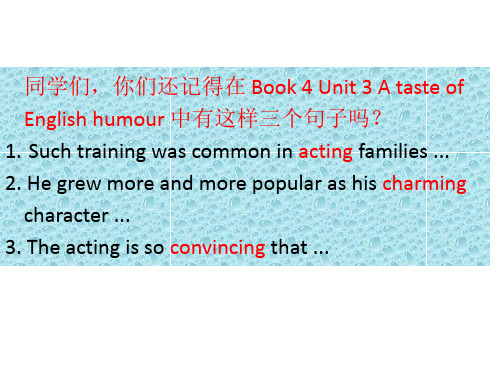
过去分词作表语, 表示被动或完成, 有时表示主语(人)所处的心理状态; 而 动词-ing作表语, 表示主动或进行。
3. 有些动词如interest, worry, surprise, frighten,等通常用其过去分词形式 来说明人的情况,用动词-ing形式 来说明物的情况。如:
[自我归纳] 1. 过去分词作定语时,表示的动作在
谓__语__动__作__之前发生,已经完成并具 有_被__动_意义(见句1)。此时,作 定语的过去分词一般是由_及__物__动 词变来的,因为只有此类动词才有 被动意义。
2. 单个的过去分词作定语, 一般放在所修饰
的名词 _之__前__ (见例句2、3); 但如果被修饰的词是
He got interested in two theories explaining how cholera killed people.
Neither its cause, nor its cure was understood.
二、过去分词作表语 [观察] 1. He became interested in two theories. 2. But he became inspired when he thought about helping ordinary people exposed to cholera.
There is nothing changed here since I left this town.
3. 过去分词短语有时还可用作非限制 性定语,相当于一个非限制性定语 从句,前后用逗号分开。如: Some of them, born and brought up in rural villages, had never seen a train.
人教版 高中英语 必修5 unit1 知识讲解 过去分词作表语和定语
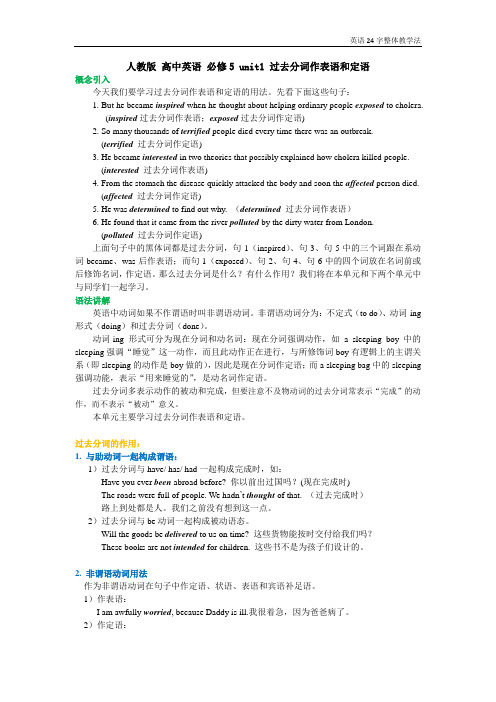
人教版高中英语必修5 unit1 过去分词作表语和定语概念引入今天我们要学习过去分词作表语和定语的用法。
先看下面这些句子:1. But he became inspired when he thought about helping ordinary people exposed to cholera.(inspired过去分词作表语;exposed过去分词作定语)2. So many thousands of terrified people died every time there was an outbreak.(terrified过去分词作定语)3. He became interested in two theories that possibly explained how cholera killed people.(interested 过去分词作表语)4. From the stomach the disease quickly attacked the body and soon the affected person died.(affected过去分词作定语)5. He was determined to find out why. (determined过去分词作表语)6. He found that it came from the river polluted by the dirty water from London.(polluted过去分词作定语)上面句子中的黑体词都是过去分词,句1(inspired)、句3、句5中的三个词跟在系动词became、was后作表语;而句1(exposed)、句2、句4、句6中的四个词放在名词前或后修饰名词,作定语。
那么过去分词是什么?有什么作用?我们将在本单元和下两个单元中与同学们一起学习。
语法讲解英语中动词如果不作谓语时叫非谓语动词。
高二英语必修五unit1知识点
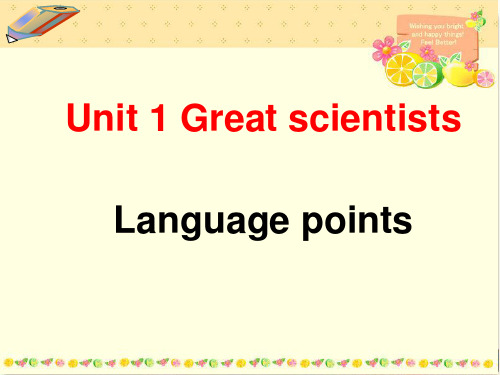
absorb one’s attention 吸引某人的注意力
be absorbed in sth.
专心于某事
be absorbed by/into 被……吞并;为……所吸收
Clever children absorb knowledge easily. He is absorbed in his business.
3、难点
过去分词作定语,表语
一、重要词汇拓展
1.science n.科学 →scientific adj.科学的→ scientist n.科学家 2. announce v.宣布 →announcement n.宣布→ announcer n.广播员,告知者 3. instruct v..指导,命令 →instruction n.指导,指示→ instructive adj.有益的,教育性的 4. enthusiastic adj.热心的,热情的 →enthusiasm n.狂热,热心→ enthusiast n.热心家,狂热者 5. valuable adj.有价值的 →value n. 价值 → value v. 估价, 评价
3. Neither its cause nor its cure was understood. ▲cure vt.&n. 治愈,治疗法;常用于cure sb. of ...结构中。
【易混辨析】
treat和cure
(1) treat强调治疗过程。 treat还可作“对待;看待;款待;请客”讲。 treat sb for sth 医治某人……病 treat...as...把……看作/视为…… treat sb to...请某人……
▲ be exposed to 暴露于……
高手过招
必修5_unit1_过去分词作定语和表语(上课用)
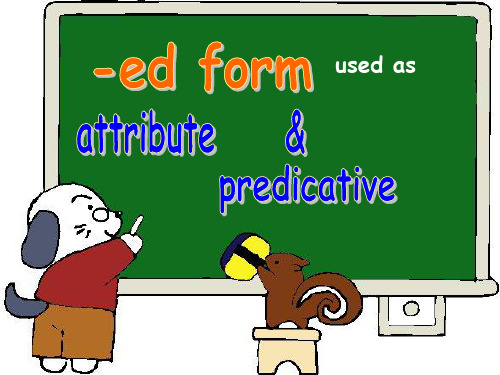
B. to be written
C. written
D. being written
was constructed in only 2 year.
练习二 单句改错
1. They were all amusing at what he said.
2. He was very exciting to hear the news that their team had won.
3. The situation was a bit discouraged.
depressing ~ depressed
Fill in the blank with proper words.
1. A. Nobody was interested in the story he told. B. The story he told was very interesting .
people addicted to drugs
a novel written by Luxun the advice given to the patient an old man supported by his son a school built for orphans
单个过去分词修饰 something, everything, anything, nothing,
( interested, interesting )
2. A. Everybody was excited to hear the news.
B. The news is very exciting indeed.
( excited, exciting ) 3. A. The result of the test was rather disappointing.
高中英语课件-过去分词-语法-必修5

He is the man swimming in the river just now.
He was reading a novel written by Charles Dickens.
结论:
区别பைடு நூலகம்
现在分词作定语,表示动作_正__在__进__行___, __主__动___意义;
过去分词作定语,表示动作在谓语之前 已_完_成_____,或具有__被__动____意义.
前面;过去分词短语作定语,常放在被修饰
词的后面。注意单个的过去分词修饰不定
代词something,everything,nobody等
和指示代词those等至于其后。 He is one of those invited.
注:2. left(剩下的), given(所给 的),concerned(有关的)等个别词, 习惯上也用作后置定语
an attribute
the predicative
6. astonished children
6. children astonished at/by …
7. a broken vase 8. a closed door 9. the tired
audience 10. a trapped
7. a vase broken by… 8. a door closed by… 9. the audience tired of … 10. an animal trapped
=The player who is loved by many people is Yao Ming.
二. 过去分词作表语
位于系动词后,不表示“被动”或“完 成”,而是表示主语的状态、特点或思想 感情等。相当于形容词
高二英语必修五_名师语法课堂:过去分词作定语和表语用法详解
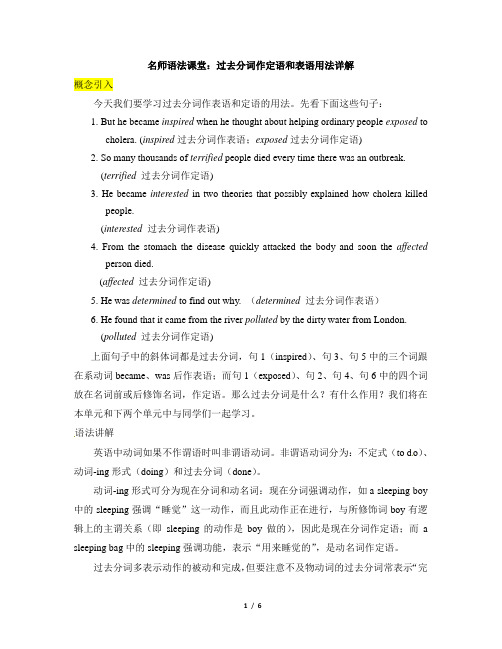
名师语法课堂:过去分词作定语和表语用法详解概念引入今天我们要学习过去分词作表语和定语的用法。
先看下面这些句子:1. But he became inspired when he thought about helping ordinary people exposed tocholera. (inspired过去分词作表语;exposed过去分词作定语)2. So many thousands of terrified people died every time there was an outbreak.(terrified过去分词作定语)3. He became interested in two theories that possibly explained how cholera killedpeople.(interested 过去分词作表语)4. From the stomach the disease quickly attacked the body and soon the affectedperson died.(affected过去分词作定语)5. He was determined to find out why. (determined过去分词作表语)6. He found that it came from the river polluted by the dirty water from London.(polluted过去分词作定语)上面句子中的斜体词都是过去分词,句1(inspired)、句3、句5中的三个词跟在系动词became、was后作表语;而句1(exposed)、句2、句4、句6中的四个词放在名词前或后修饰名词,作定语。
那么过去分词是什么?有什么作用?我们将在本单元和下两个单元中与同学们一起学习。
语法讲解英语中动词如果不作谓语时叫非谓语动词。
非谓语动词分为:不定式(to d o)、动词-ing形式(doing)和过去分词(done)。
2018-2019学年高中英语人教版必修5Unit 1 Section Ⅲ Grammar——过去分词作定语和表语
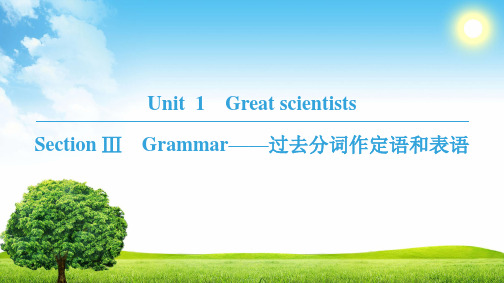
Section Ⅲ
Grammar——过去分词作定语和表语
[语 境 自 主 领 悟]
语 境 自 主 领 悟
先观察原句 1.From the stomach the disease quickly attacked the body and soon the affected person died. 2.So many thousands of terrified people died every time there was an outbreak. 3.He found that it came from the river polluted by the dirty water from London. 4.But he became inspired when he thought about helping ordinary people exposed to cholera.
返 首 页
语 境 自 主 领 悟
3.现在分词与过去分词作表语的区别 过去分词 现在分词 表示人自身的感受或事物自身的状态,常译作“感到……的” 表示事物具有的特性,常译作“令人……的”
语 法 应 用 落 实
They became so worried that they stayed awake all night.
返 首 页
语 法 精 要 点 拨
语 法 应 用 落 实
语 境 自 主 领 悟
2.过去分词作表语与被动语态的区别 过去分词作表语时,强调主语所处的状态,而动词的被动语态表示主语是动作 的承受者,强调动作。 The cup is broken.
语 法 应 用 落 实
语 法 精 要 点 拨
英语必修五unit1语法

pay sb. by the hour” 计时给某人报酬。 此题被动结构作表语。类似的有:get
burnt, get hurt , get wounded.
• What he has done is really __C__.Now his parents are _____ him.
③ She was very disappointed to hear the result.
④ He’s quite experienced in teaching beginners.
现在分词和过去分词作表语的区别
• V-ing 形式表示“令人……的” • V-ed 形式表示“某人感到……的”
2. 作定语的动词-ing形式如是一个短语,则 应放在被修饰词的后面,做后置定语,相当 于一个定语从句。
Do you know the boy playing basketball? (=who is playing basketball) 你ciple as attribute & predicative
①过去分词做定语:表被动,表完成。 ②现在分词作定语:表主动,表进行。 ③不定式作定语:表示将要发生的动作。
区别 2
Falling leaves Fallen leaves
区别 2
1. Falling leaves 2. Fallen leaves 3. Disappointing news 4. Disappointed people 5. Exciting story 6. Excited people 7. Tired people/ I’m tired 8. Tiring film
ago. 我们要去看那座建于几百年前的桥。
必修5unit1过去分词作定语或表语

过去分词作定语或表语【教学内容】过去分词作定语或表语【教学目标】熟练掌握过去分词作定语或表语时的不同用法【教学重难点】过去分词作定语或表语的用法、过去分词和动词的-ing形式和不定式的区别【教学过程】▼动词的-ed形式的句法功能一、作表语动词的-ed形式作表语,表示主语的某种性质或状态。
A.状态性动词的-ed形式作表语例:1.The shop has remained shut for a week.这家商店关门一周了。
2.All the people present were already seated. Waiting for the conference to start.所有到场的人都已入座,等着会议的开始。
B.形容词性的动词的-ed形式作表语注:动词的-ed形式作表语表示事物的性质,这些词往往被视为形容词,可以用very修饰。
例:1.Most of middle school students are interested in pop stars and NBA star players.大多数中学生对流行歌手和NBA明星感兴趣。
2.I was very surprised to see little Jimmy run so fast in the game.在比赛中看见小吉米跑的这么快,我非常惊讶。
【随即随练】翻译1.看完信后,他显得很忧虑。
He looked worried after reading the letter.2.商店关门了。
The shop is closed.3.她对那个故事感兴趣。
She is interested in the story.4.她觉得困惑甚至有点害怕。
She felt confused,and even frightened.二、作定语动词的-ed形式作定语有的置于被修饰词的前面,有的置于被修饰词的后面。
A.置于被修饰词的前面单个的-ed形式作定语往往置于被修饰词的前面,及物动词的-ed形式,表示被动和完成意义,不及物动词的-ed形式仅表示完成意义。
高二英语必修五unit1知识点

▲absorb意为“吸收;吸引;使专心;合并;吞并”,常见结构: absorb one’s attention 吸引某人的注意力 be absorbed in sth. 专心于某事 be absorbed by/into 被……吞并;为……所吸收
Clever children absorb knowledge easily. He is absorbed in his business.
3、难点
过去分词作定语,表语
一、重要词汇拓展
1.science n.科学 →scientific adj.科学的→ scientist n.科学家 2. announce v.宣布 →announcement n.宣布→ announcer n.广播员,告知者 3. instruct v..指导,命令 →instruction n.指导,指示→ instructive adj.有益的,教育性的 4. enthusiastic adj.热心的,热情的 →enthusiasm n.狂热,热心→ enthusiast n.热心家,狂热者 5. valuable adj.有价值的 →value n. 价值 → value v. 估价, 评价
3. He placed a fixed sun at the centre of the solar system with the planets going round it …..
(with + 宾语+ v. –ing构成的复合结构在句中通常作为状语)
1. John Snow defeats “King Cholera”. ▲defeat意为“击败;打败;使(计划,希望)落空”。
【易混辨析】
defeat, beat与win defeat, beat都表示在战斗或竞赛中“战胜,打败(对手)”,后接竞争对手。如 I can beat/defeat you at swimming. win也表示“战胜,赢得”,但宾语通常是比赛、战争、奖品或表尊重、崇拜之 类意义的词。
人教必修五 unit2 sightseeing in london课文精讲(批注版)
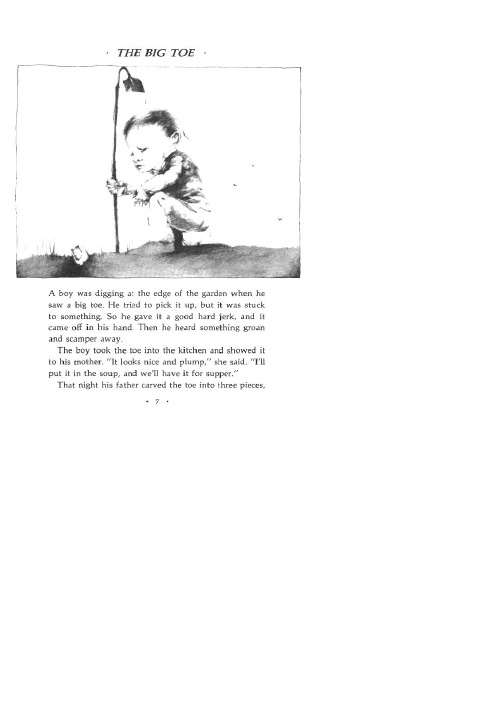
养成二次阅读习惯,培养逻辑推理能力学习母语如此,学习英语也是如此。
我们在掌握基本语言后,必须学会脱离语言本身,我们首先要理解文章整体而非个别词句。
文章的体裁、内容可能千差万别,但文章是人写出来的,那就必定有一定逻辑。
词句都不过是表象,而把握作者的意图才是解题之关键。
考试都在向能力测试转变,我们也必须摈弃单纯强调应试技巧的老路。
要想快速扎实提高阅读能力,我们可从以下几个方面努力:很多书上要求学生学会分析文章的结构,其实就是要求英语学习的的学生提高逻辑推理能力。
在平时练习中,学生做完阅读,惟一可做的就是对答案,事实上,纠正答案后对文章的再次阅读往往至关重要。
第一遍读文章时,我们应当模拟考试的紧张气氛,尽量高质快速。
但,对完答案后,我们有充足的时间再次阅读文章。
第二次阅读文章我们的目的不在是获取信息,而是把握文章的布局安排,分析作者的意图。
我们必须带着思考再次阅读文章,问问自己以下问题:如果自己写同样题目或题材的文章,会采取何种文章布局?如我们自己设想的布局与作者不同,那么具体不同之处在何处?这篇英语文章与以前读过的同体裁文章相比,有何特点?也许有人会说,这样的英语的训练不就成了精读课了吗?如果时间允许,二次阅读成了精读,又有何不可?讲求速度的范读是应试而用,要想真正培养逻辑推理能力,提高阅读水平,还非精读不可。
文章的是永远读不完的,如果想着去读200篇各种模拟阅读题,倒不如踏踏实实读50篇历年真题。
另外,地道的文章分析多了,对自己写文章布局谋篇也不无好处。
SIGHTSEEING IN LONDON伦敦观光记Worried about the time available, Zhang Pingyu had made a list of the sites she wanted to see in London.Her first delight was going to the Tower. It was built long ago by the Norman invaders of AD 1066.Fancy! This solid stone, square tower had remain ed standing for one thousand years.Although the buildings had expanded around it, it remained part of a royal palace and prison combined.To her great surprise, Zhang Pingyu found the Queen's jewels guarded by special royal soldiers who, on special occasions, still wore the four-hundred-year-old uniform of the time of Queen Elizabeth I.There followed St Paul's Cathedral built after the terrible fire of London in 1666.It looked splendid when first built! Westminster Abbey, too, was very interesting.It contained statues in memory of dead poets and writers, such as Shakespeare.Then just as she came out of the abbey, Pingyu heard the famous sound of the clock, Big Ben, ringing out the hour.She finished the day by looking at the outside of Buckingham Palace, the Queen's house in London. Oh, she had so much to tell her friends!The second day the girl visited Greenwich and saw its old ships and famous clock that set s the world time.What interested her most was the longitude line.It is an imaginary line dividing the eastern and western halves of the world and is very useful for navigation.It passes through Greenwich, so Pingyu had a photo taken standing on either side of the line.The last day she visited Karl Marx's statue in Highgate Cemetery.It seemed strange that the man who had developed communism should have lived and died in London.Not only that, but he had worked in the famous reading room of the Library of the British Museum.Sadly the library had moved from its original place into another building and the old reading room was gone.But she was thrilled by so many wonderful treasures from different cultures displayed in the museum.When she saw many visitors enjoying looking at the beautiful old Chinese pots and other objects on show, she felt very proud of her country.The next day Pingyu was leaving London for Windsor Castle. "Perhaps I will see the Queen?" she wondered as she fell asleep.。
2020高考一轮复习:必修5 Unit 3 知识串讲讲义

2020高考一轮复习教材串讲必修5 Unit 3 Life in the future讲义1._____________________________n.方面;层面2. ____________________________n.[C]印象;感觉3. ____________________________adj.时常发生的;连续不断的____________________________adv.不断地4. ____________________________adj.在前的;早先的5. ____________________________n.&vt. n.[C]向导;导游;指南;手册vt.为……领路;带领;引导6. ____________________________n.[U]缺乏;没有vt.&vi.缺乏;短少;没有7. ____________________________n. [C]& [U]调整;调节8. ____________________________n. [C]①开关;电闸②转换;改变;变化vt.①转变;交换②开关(电器等设备)9. ____________________________adj.乐观的____________________________ adj.悲观的10. ____________________________n. & adj.瞬间;片刻;立即的;立刻的1. ________________________________拿起;开始;继续2. ________________________________(困境后)恢复;完全复原3. ________________________________看不见……4. ________________________________打扫;横扫5. ________________________________(快捷而悄声地)移动;溜进6. ________________________________加速1. ______________________________________________________________.由于缺乏新鲜空气,我感动头疼。
(完整版)人教版高中英语必修五Unit1知识点详解

必修5 Unit1 Great scientistsPart 1. Warming up1.explain及物动词(vt.)解释;说明;阐明[(+to)][+wh-][+(that)]He explained that he had been cheated. 他解释说他是上当受骗了。
Can you explain how the machine operates?你能解释一下这机器是如何运转的吗?Please explain this rule to me.请给我讲解一下这条规则。
不及物动词(vi.)解释;说明;辩解I've got to explain about it. 我得解释一下此事。
2.characteristicn. 特征;特性Kindness is one of his characteristics.adj. 独特的I heard my friend’s characteristic laugh.be characteristic of sb./sth. 是.....的特性Such bluntness is characteristic of hin. 如此迟钝是他的特性。
3. Who put forward a theory about black holes?put forward 提出(建议等);提名;提前,把时钟往前拨He put forward a new plan. 他提出一个新计划。
May I put your name forward as a possible chairman of the committee?我能否提名你当委员会主席?[归纳拓展]put down 记下;镇压put out 关掉;熄灭put aside 放在一边;储存;保留put off 推迟;延期put up 建造;举起;张贴put on 穿上put away 收好选词填空(put off, put up, put forward, put aside, put out)①The plan that you _____ at the meeting is wonderful.②Many tall buildings were _____ along the road.③Firefighters have been called to _____ the fire in the city center.④He has a little money to _____ for a rainy day.⑤Don’t _____ until tomorrow what can be done today.Part 2. Pre-reading, reading and comprehending1. Do you know how to prove a new idea in scientific researchhow to prove a new idea 为“疑问词+不定式”结构,该结构可在句中作主语、宾语、表语等。
高中英语必修5重点短语及句型

半期考资料1 高二英语必修5 王宝辉Book 5 Unit 1 Great ScientistsPart 1 课文知识点归纳1. put forward 提出put off 推迟put up with 忍受2. attend to 照顾, 护理3. cure sb. of sth 治愈某人某种疾病a cure for…治疗…法(药)4. challenge sb. to do sth. 向某人挑战做…challenge sb. to sth. 就某事向某人挑战5. be absorbed in 全神贯注于= concentrate on6. suspect sb. of sth 怀疑某人做某事suspect that…7. blame sb. for sth. 为某事责怪某人blame sth. on sb. 把某事归咎于某人8. link sth to把…与…连接起来, 使…有联系9. instruct sb to do sth 命令某人做某事instruct sb in sth 在某方面教导某人10. be strict with sb. 对某人严格要求be strict in sth. 对某事严格要求11. lead to 造成, 导致, 通向12. make sense 讲得通, 有意义make sense of 了解…的意义, 理解13. put sth. in order 按…顺序来整理14. draw a conclusion 得出结论15. of one’s day 在某人的那个时期16. expose… to 使显露, 暴露17. apart from 除…之外18. be cautious about / of …对…小心谨慎with caution 小心谨慎19. be severe with sb. 对…严厉20. lift up 举起21. look into 调查22. be determined to do sth 决心/ 决定做某事23. make investigations 进行调查24. take in 吸收, 欺骗25. come to an end 结束26. punish sb for sth. 因某事惩罚某人27. at times 时而, 不时28. be for / against 支持/ 反对29. a link between…and…与…间的联系/关联30. point of view 观点31. hold discussions 进行讨论32. to one’s surprise 使某人感到惊奇的是33. believe in 信任, 信仰, 相信34. prevent sb from doing sth 阻止某人做某事35. in one’s honor / in honor of sb.为了纪念某人句型: 1. It seemed that the water was to blame. be to blame 受责罚(主动形式表被动)2. A woman, who had moved away from Broad Street, liked the water from the pump so muchthat she had it delivered to her house every day.have sth done 请某人来做某事/ 遭遇,经历,体验3. To prevent this from happening again, John Snow suggested that the source of all watersupplies be examined.suggest 意为”建议”时, 宾语从句谓语动词应使用虚拟.4. The second suggested that people absorbed this disease into their bodies with their meals.suggest 意为”认为, 指出, 提出, 暗示”时, 宾语从句谓语动词则使用陈述语气5. Only if you put the sun there did the movements of the other planets in the sky make sense.Only + 状语/ 状语从句位于句首, 主句需用倒装If only “如果…就好了”, 后接虚拟条件句.[选词填空](1) I wake up _______________ the alarm clock rings(2) _______________ John were here with us!(3) _______________ I get a job can I have enough money to continue my studies at college.6. He placed a fix sun at the center of the solar system with the planets going round it and onlythe moon still going round the earth.with 的复合结构(with + 宾语+ 宾补)Book 5 Unit 2 The United KingdomPart 1 课文知识点归纳1. consist of = be made up of 由…组成make up 组成, 编造, 化妆2. get all five questions right五个问题全答对了3. divide… into…把…分成separate…from 把…分离, 分开4. refer to 提到,涉及,参考,指的是5. without conflict 没有纷争6. in the early / middle / late twentieth century在二十世纪早期/ 中叶/ 后期7. break away (from) 脱离8. to one’s credit 为…带来荣誉, 值得赞扬9. for convenience 为了方便起见10. in the 1060s 在十一世纪六十年代11. find evidence of 找到…的证据12. keep your eyes open 睁大眼睛13. make your trip enjoyable and worthwhile使得你的旅程有趣又值得14. leave out 省去, 遗漏, 不考虑15. take the place of = take one’s place 取代…16. break down 机器损坏, 破坏17. be unwilling to do…不乐意做…18. sb. be familiar with sth. 某人对…熟悉sth. be familiar to sb. 某物对…是熟悉的19. a furnished house with all modern conveniences一套有各种现代设施的配有家具的房子20. be alike in…在…方面类似21. pick up 拾起, 养成…习惯, 学到22. wear the four-hundred-year-old uniform穿着一件有四百年历史的制服23. in memory of…为了纪念…24. just as…正当…的时候25. have a photo taken (have sth. done) 拍照26. on show 被展出27. feel / be proud of 为…感到骄傲28. leave …for…离开…前往…29. fall asleep 睡着30. have problems in doing…做某事遇到麻烦31. at one time 曾经32. break down 打破, 分解33. be delighted with 对…感到高兴34. take place 发生,举行35. at this / that time 在此时/ 在那时36. at war (with) 处于交战状态37. be friendly to 对…友好38. change one’s mind 改变主意39. be disappointed at 对…感到失望40. come close to 接近41. took flight (take flight 703) 逃跑, 飞翔(乘坐703次航班)42. start the fire 点火, 放火43. make into 把…职称, 使…转变为句型: 1. How long does it take to fly from Beijing to London Heathrow Airport?it takes sb. sometime to do sth. 花了某人多少时间做某事2. These cities are not as large as those in China.A 是B的三倍长: 1) ______________________________________2) ______________________________________3) ______________________________________3. It’s a pity that the industrial cities built in the nineteenth century do not attract visitors.built in the nineteenth century 过去分词短语作后置定语修饰citiesIt’s a pity that…“遗憾的是…”常使用陈述语气; 若是跟虚拟语气, 常表示“竟然, 居然”等强烈的感情色彩.[句型翻译]他错过了这次机会, 真是可惜_________________________________________________真可惜, 他竟然错过了这样好的一个机会._________________________________________________4. Worried about the time available, Zhang Pingyu had made a list of the sites she wanted tosee in London.Worried about the time available 过去分词短语作原因状语5. This solid, square tower had remained standing for one thousand years.remained standing 仍旧矗立着, remain 是一个系动词, 表示”一直保持着某种状态”remain还可以作不及物动词, 意为”剩下, 留下”6. There followed St. Paul’s Cathedral built after the terrible fire of London in 1666.There followed…接下来的是7. It seemed strange that the man who has developed communism should have lived and diedin London.It’s strange / natural / important / necessary that + (should do) …Book 5 Unit 3 Life in the futurePart 1 课文知识点归纳1. make a deep / strong impression on sb.给某人留下深刻印象impress sb with sth = impress sth on sb 使某人记住某事2. take up 拿起,占用,接受,开始,从事,选修speed up 加速sweep up 打扫,横扫,掠过3. remind sb of sth使某人回想起某事/提醒某人某事remind sb to do sth 提醒某人去做某事remind sb that 提醒某人4. as a result 结果5. suffer from 遭受,患…病6. be similar to 和…相似7. feel sleepy 感到困倦8. fall fast asleep 睡得很香9. the / a lack of 缺乏…for lack of…由于…的缺乏be lacking in 缺乏(品质/特点)lack for…(否定句) 缺乏…10. in no time / in an instant 很快,立即11. be back on one’s feet (从病痛/挫折中)复原12. in all directions 四面八方13. ab. lose / catch sight of…看不见/看见sb / sth be in / out of sight 看得见/看不见at first sight 第一眼at the sight of 一看见…就…14. provide A with B 向A提供B15. lie relaxed 放松16. be previous to…早于17. have little oxygen left 剩下很少的氧气have twenty minutes left 剩下二十分钟18. for health reasons 处于健康原因19. bend the rules 变通,放宽20. on earth 究竟,到底21. be under repair在维修中22. make adjustments to 调节,适应23. fasten the safety belt 从…系紧安全带24. from under the floor 从…下25. stay long 停留,逗留26. in space 在太空27. the up-to-date invention 最新的发明28. environment friendly 环保29. dispose of 处理,解决30. be greedy for / to do sth. 渴望,贪婪31. programme robots 为机器人设计程序32. perform tasks 完成工作33. space settlements 太空定居点34. have the chance of 有…的机会35. be described as 被描述为…36. be equipped with 配备有…37. without permission 未经允许38. feed into 输入进…39. top-of-the-range 最高标准的, 顶级的40 slide into 溜进,滑进句型: 1. Below are some of the main aspects of life today.2. My new surroundings are difficult to tolerate.3. The air seemed thin as though its combination of gases had little oxygen leftas though引导方式状语从句[句型翻译] 她看起来似乎会把这件事告诉所有人___________________________________________________似乎你是对的___________________________________________________4. I lost sight of Wang Ping when we reached what looked like a large market…when 引导时间状语从句中又包含一个what引起的宾语从句.即:what looked like a large market 作reach的宾语5. Exhausted, I slid into bed and fell fast asleep.exhausted过去分词在句中作状语, 相当于As I was exhausted.6. This is similar to the “Jet lag” you get from flying, but it seems you keep getting flashbacks from your previous time period.并列分句中包含有句型: It seems (that)…意为”似乎…, 看来…”Book 5 Unit 4 Making the newsPart 1 课文知识点归纳1. be delighted at / with sth. 对某事感到高兴be delighted to do sth. 很高兴做某事be delighted + that从句2. go out on a story 外出采访3. cover a story 进行新闻采访4. be eager to do sth. 渴望做某事be eager for sth 渴望某事5. assist (sb.) in / with sth帮助/救援/协助某人做某事assist (sb.) in doing sthassist (sb.) to do sth6. concentrate on 集中,全神贯注于7. have a good nose for 嗅觉灵敏, 善于8. inform sb of sth 告知某人某事9. keep sth in mind 记住10. depend on 依赖,取决于11. get sth. straight 搞清楚,弄明白12. accuse sb of sth 因某事而指责或控告某人13. so as to do sth. 为了做某事14. stop sb. (from) doing sth 阻止某人做某事15. look forward to (doing) sth 期待某事16. by accident意外地17. get / be adsorbed in 专心于…18. defend sb. against…保卫某人免受19. by the name of…名叫20. set to + n.着手,开始做某事set out to do sth. 开始, 着手做某事set about doing sth.21. pass sth on to sb. 把某人递给某人22. last of all 最终23. make an appointment 约会make appointments24. be supposed to 应当,认为必须25. approve of sb. sth 赞成,称许,批准26. a trick of the trade 诀窍,窍门play a trick (tricks) on sb. 捉弄,戏弄某人27. take notes 记录,记下28. ahead of 在…前面,先于…句型: 1. Never will Zhou Yang forget his first assignment at the office of a popular English newspapernever为表示否定含义的副词放在句首引起倒装.2. Not only am I interested in photography, but I took am amateur course at university toupdate my skills.not only…but also…引导的倒装句. not only放在句首,后接句子, 用倒装结构3. Only if you ask many different questions will you acquire all the information you need to know.Only + 状语(单词/短语/从句)放句首,引起倒装. (若only + 状从, 主句谓语动词倒装)[句型翻译]只有你才可以到处走动_________________________________________________只有每个人都尽力而为, 我们的城市才会变得更美._________________________________________________4. Here comes my list of dogs and don’ts.here, there, now, then等副词放在句首用倒装句(完全倒装)5. Have you ever had a case where someone accused your journalists of getting the wrong endof the stick?当先行词为case, stage, situation, point时, 多用where引导定语从句Book 5 Unit 5 First aidPart 1 课文知识点归纳1. fall in 生病2. get injured / burned / infected受伤/ 烧伤/ 受感染3. do / give / offer first aid to sb.对某人实施急救4. if possible 有可能的话5. be taken from 从...节选6. act as 充当,担任7. a barrier against... 抵御...的一道屏障8. prevent...from doing sth 阻止...做某事9. sense of touch 触觉10. a variety of 各种各样的11. depend on... 取决于12. within a day or two 在一两天内13. for a moment 片刻14. electric shock 触电15. turn white 变白16. squeeze out 榨出;挤出17. over and over again 多次18. in place 在适当的位置19. sit up 做起来;迟睡熬夜20. knock over 撞到;打翻21. cut off 切掉;使隔绝22. a number of 许多23. stick to 坚持;黏在...上24. apply to sb. for sth. 向某人申请...apply to sth 适用于apply oneself to 专心从事...25. make a difference 产生区别,有影响26. protect...against... 保护...免受...27. in case 如果;万一;以免28. after use 使用后29. out of the reach of sb. / out of one's reach某人够不着的地方30. leave sb. alone 让某人独自呆着;不打扰31. cause a damage to 对...造成损害32. set...fire on 放火烧33. in good condition 状况良好句型: 1. Remove clothing using scissors if necessary unless it is stuck to the born.◇unless引导条件状语从句,意思是“除非...;如果不”,相当于if not2. John was studying in his room when he heard screaming.when在句中是并列连词,意思是“正在这时/那时”,◇常见句型: be doing...when...,正在做...这时...;had done...when...刚做完...这时...;be about to do...when...就要...这时...;be on the point of doing...when...正要做...这时...[句型翻译]正当我在街上乱逛之时, 我看见了一位老朋友.________________________________________________我正准备去游泳, 突然我们的向导看见了我并大声叫我.________________________________________________3. There is no doubt that John's quick thingking and the first aid skills he learned at schoolsaved Ms. Slades's life.◇There is no doubt...(= No doubt that…) 毫无疑问...[句型翻译]毫无疑问, 我们将很快实施这个计划.________________________________________________4. It was John's quick action and knowledge of first aid that saved Ms. Slade's life.◇本句为强调句型。
人教版高二英语必修5过去分词语法讲解(课堂PPT)
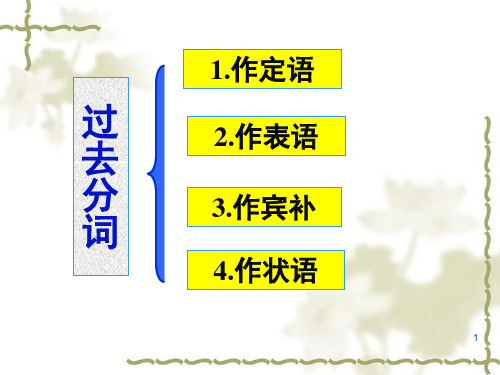
过 去
2.作表语
分 词
3.作宾补
4.作状语
1
The Past Participle used as
Attribute
2
过去分词作定语
. 教学目标 1、过去分词作定语的意义
. 2、过去分词作定语的位置
3、过去分词作定语与现在分词作定语的 区别
.
3
过去分词作定语
过去分词作定语的基本用法 1.过去分词作定语的意义
反展中国家
developed countries
发达国家
falling leaves
落叶(正在进行)
fallen leaves
落叶(已经完成) 12
The child standing over there is my brother.
The room facing south is our classroom. The book written by Lu Xun is very good. The road completed yesterday is leading
The water
___________________________(送到她家
的水) carried disease.
16
The English today is quite different from the
English __________________的位置
(1)单个的过去分词作定语一般放在被 修饰的名词之前,但left 、given只作后 置定语
1.The broken vase has been thrown outside. 2.The wounded soldier was looked after
新人教英语必修五unit1词汇及语法解析

人教新课标必修五unit1词汇及语法解析1. characteristic用作名词,意思是“特点;特征;特性”与feature意思相近。
它也可用作形容词意为“典型的;具有…的特点的”。
Traffic jams are a characteristic of large cities. 堵车是大城市的特点。
The smell is characteristic of garlic. 这气味是大蒜的特点。
He speaks with characteristic passion. 他以特有的热情说话。
2. put forward的意思是“提出主意、计划(offer, suggest , an idea)等”。
He often puts forward some useful advice. 他常常提出一些有用的建议。
〖帮你归纳〗put的常用词组有:put aside节省(钱、时间);储蓄;把……放在一边put away储存(钱);放好put back拨慢;搁置put down放下;记下;击败;使(飞机)着陆;put off延期;推迟put on上演;穿上;戴上put out熄灭;关掉;扑灭put through接通电话;完成put up with忍受;忍耐put into action/effect/practice实施;实行3. examine的意思是“检查;审查;诊察;考察;测验”。
The doctor examined her carefully.医生仔细地给她作了检查。
The teacher examined the students on the book they read. 老师就学生读的书考学生。
examine指的是仔细观察以了解或发现什么东西,也可用于医生检查病人,以书面或口头的形式考察学生的知识与能力。
check指的是通过检查以确保某事物正确、安全、满意或处于良好状态,核对,核实某物等。
过去分词的用法
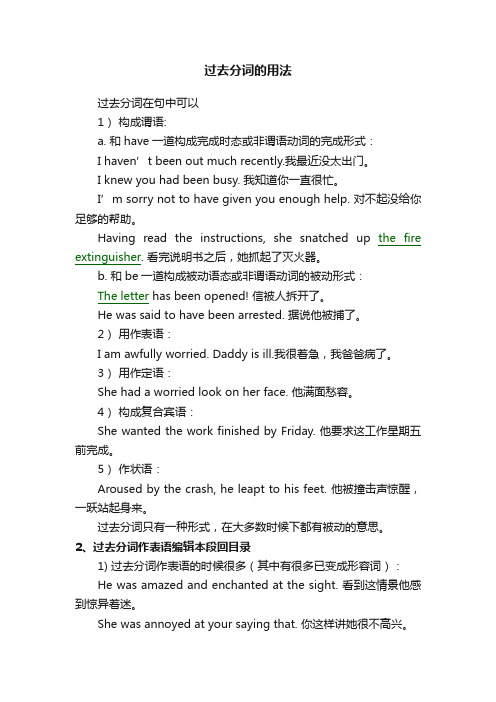
过去分词的用法过去分词在句中可以1)构成谓语:a. 和have一道构成完成时态或非谓语动词的完成形式:I haven’t been out much recently.我最近没太出门。
I knew you had been busy. 我知道你一直很忙。
I’m sorry not to have given you enough help. 对不起没给你足够的帮助。
Having read the instructions, she snatched up the fire extinguisher. 看完说明书之后,她抓起了灭火器。
b. 和be一道构成被动语态或非谓语动词的被动形式:The letter has been opened! 信被人拆开了。
He was said to have been arrested. 据说他被捕了。
2)用作表语:I am awfully worried. Daddy is ill.我很着急,我爸爸病了。
3)用作定语:She had a worried look on her face. 他满面愁容。
4)构成复合宾语:She wanted the work finished by Friday. 他要求这工作星期五前完成。
5)作状语:Aroused by the crash, he leapt to his feet. 他被撞击声惊醒,一跃站起身来。
过去分词只有一种形式,在大多数时候下都有被动的意思。
2、过去分词作表语编辑本段回目录1) 过去分词作表语的时候很多(其中有很多已变成形容词):He was amazed and enchanted at the sight. 看到这情景他感到惊异着迷。
She was annoyed at your saying that. 你这样讲她很不高兴。
We were so bored that we couldn’t help yawning. 我们烦得要命禁不住打哈欠。
2019年英语新同步浙江专用必修五讲义:Unit 1 Section Ⅲ Grammar—_过去分词作定语和表语
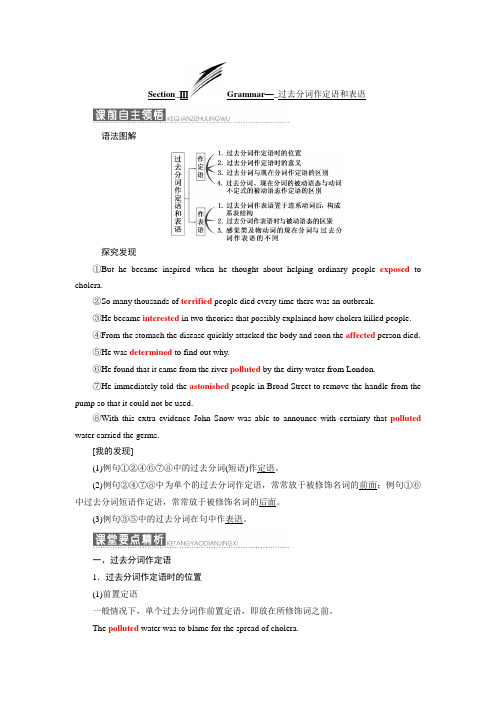
Section_ⅢGrammar—_过去分词作定语和表语语法图解探究发现①But he became inspired when he thought about helping ordinary people exposed to cholera.②So many thousands of terrified people died every time there was an outbreak.③He became interested in two theories that possibly explained how cholera killed people.④From the stomach the disease quickly attacked the body and soon the affected person died.⑤He was determined to find out why.⑥He found that it came from the river polluted by the dirty water from London.⑦He immediately told the astonished people in Broad Street to remove the handle from the pump so that it could not be used.⑧With this extra evidence John Snow was able to announce with certainty that polluted water carried the germs.[我的发现](1)例句①②④⑥⑦⑧中的过去分词(短语)作定语。
(2)例句②④⑦⑧中为单个的过去分词作定语,常常放于被修饰名词的前面;例句①⑥中过去分词短语作定语,常常放于被修饰名词的后面。
高中英语 Unit13 Lessons1-2 Grammar-过去分词用法小结讲练 北师版必修5
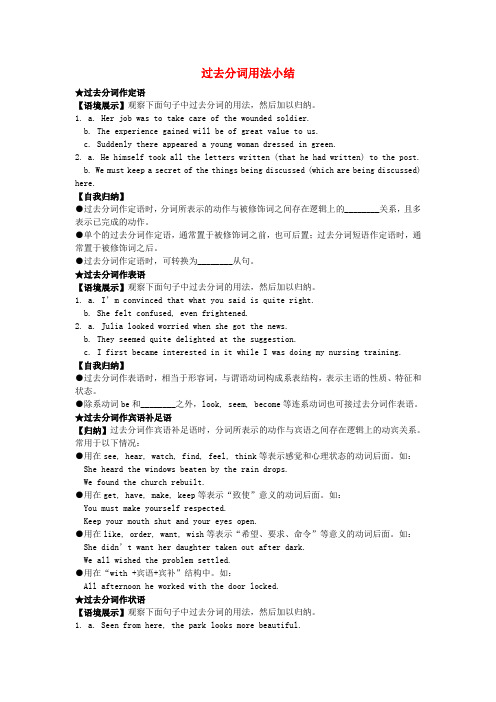
过去分词用法小结★过去分词作定语【语境展示】观察下面句子中过去分词的用法,然后加以归纳。
1. a. Her job was to take care of the wounded soldier.b. The experience gained will be of great value to us.c. Suddenly there appeared a young woman dressed in green.2. a. He himself took all the letters written (that he had written) to the post.b. We must keep a secret of the things being discussed (which are being discussed) here.【自我归纳】●过去分词作定语时,分词所表示的动作与被修饰词之间存在逻辑上的________关系,且多表示已完成的动作。
●单个的过去分词作定语,通常置于被修饰词之前,也可后置;过去分词短语作定语时,通常置于被修饰词之后。
●过去分词作定语时,可转换为________从句。
★过去分词作表语【语境展示】观察下面句子中过去分词的用法,然后加以归纳。
1. a. I’m convinced that what you said is quite right.b. She felt confused, even frightened.2. a. Julia looked worried when she got the news.b. They seemed quite delighted at the suggestion.c. I first became interested in it while I was doing my nursing training.【自我归纳】●过去分词作表语时,相当于形容词,与谓语动词构成系表结构,表示主语的性质、特征和状态。
高考英语必修五讲义Unit1SectionⅢGrammar—_过去分词作定语和表语
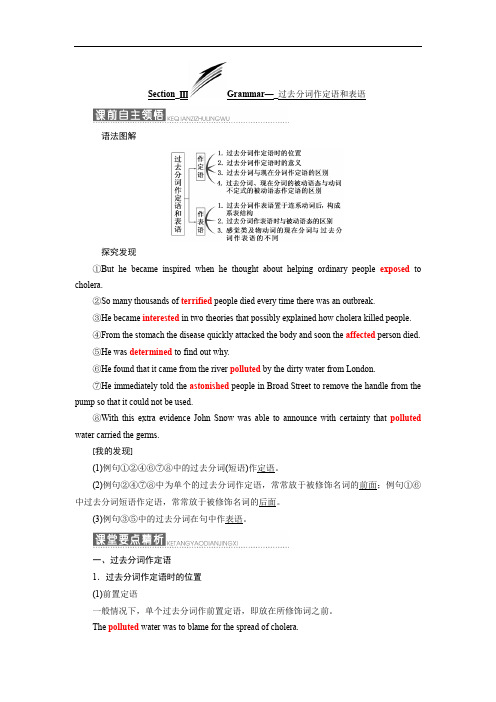
Section_ⅢGrammar—_过去分词作定语和表语语法图解探究发现①But he became inspired when he thought about helping ordinary people exposed to cholera.②So many thousands of terrified people died every time there was an outbreak.③He became interested in two theories that possibly explained how cholera killed people.④From the stomach the disease quickly attacked the body and soon the affected person died.⑤He was determined to find out why.⑥He found that it came from the river polluted by the dirty water from London.⑦He immediately told the astonished people in Broad Street to remove the handle from the pump so that it could not be used.⑧With this extra evidence John Snow was able to announce with certainty that polluted water carried the germs.[我的发现](1)例句①②④⑥⑦⑧中的过去分词(短语)作定语。
(2)例句②④⑦⑧中为单个的过去分词作定语,常常放于被修饰名词的前面;例句①⑥中过去分词短语作定语,常常放于被修饰名词的后面。
- 1、下载文档前请自行甄别文档内容的完整性,平台不提供额外的编辑、内容补充、找答案等附加服务。
- 2、"仅部分预览"的文档,不可在线预览部分如存在完整性等问题,可反馈申请退款(可完整预览的文档不适用该条件!)。
- 3、如文档侵犯您的权益,请联系客服反馈,我们会尽快为您处理(人工客服工作时间:9:00-18:30)。
Can you work out the meanings of these phrases?
in the given time
在既定的时间内
with the words given 用所给的单词
a wanted person
被通缉的人
waitresses wanted 招聘女服务员
a concerned look
The broken window mahe window which was broken made the house very ugly.
过去分词作定语可以转换为一个定语从句
Where shall we put the flowers gathered this morning? Where shall we put the flowers which were gathered this morning?
注意:过去分词和现在分词作表语的不同意义。
The story is exciting, so you will be excited when you read it.
过去分词作表语,多表示主语所处的__心__理__状__态_, 主 语往往是___,人常译为_____“__感__到__…__…;的现”在分词作表 语,往往表示主语所具有的_____,主特语征一般是_____, 常译成物___________“__令_. 人……的”
the tiger.
注意:过去分词作表语和被动语态不同
The glass is broken. The glass was broken by Jack.
用作表语的过去分词主要表示动作的完成和状态, 相当于一个_形__容__词_词。被动语态的过去分词,动作 意味很强,句子的主语是动作的__承__受_者,后常跟 __b_y__引导的短语。
What is the language that is spoken in Italy?
What is the language spoken in Italy?
Do you know all the artists invited to the party?
Do you know all the artists who were invited to the party?
II. 过去分词作表语,多表示主语所处的状态,有 被动意味,相当于一个形容词。常用来作表语的过 去分词有:interested, excited, impressed,
disappointed, bored, delighted, discouraged, drunk,
amused, astonished, tired, surprised, pleased,
注意:过去分词和现在分词作定语意义的不同。
(P91, Exercise 2)
过去分词作定语与它所修饰的名词在逻辑上有 ___动__宾___关系,表示该动作的___被__动或者____完__成; 现 在分词作定语与它所修饰的名词存在逻辑上的 __主__谓__关系,表示该动作的___主__动_或者___进__行_.
Mr. Wang.
The building to be finished next year will be our
过去分词作定语,表示分词的动作__已__经__完__成__, 现 在分词的被动语态作定语,表示分词的被动动作 ____正__在__发_,生动词不定式的被动语态作定语,表示 动词不定式的被动动作____将__要__发__生.
So, 过去分词(短语)作定语, 与其所修饰的词
之间存在着逻辑上的___被__动___关系,且表示该动作
_____已_经__完__成___。单个的过去分词作定语,通常置 于被修饰词的_____前__面__,而_____分__词__短__语___作定语, 则需置于被修饰词之后。
个别过去分词做前置定语与后置定语时意义不同。
satisfied, worried, married, frustrated, frightened, scared等.
e.g. Hearing what he said, we were all deeply
impressed. The little boy was very excited at the sight of
pleased
satisfied
scared disappointed
bore
annoyed
What do “Attribute” and “Predictive” mean? Can you give us some examples?
I.过去分词作定语
Last Sunday we went on an organized trip to the forest. A letter posted today will reach him the day after.
关切的表情
the people concerned 有关人士
注意:过去分词、现在分词的被动语态和动词不定
式的被动语态作定语意义的不同。
Most of the guests invited to the party were her
classmates.
The shopping centre being built was designed by
